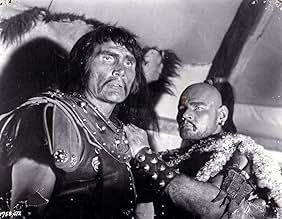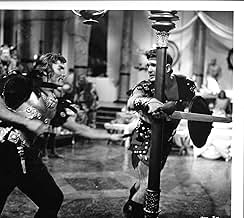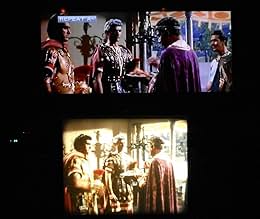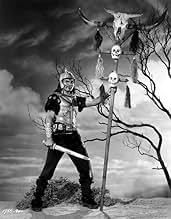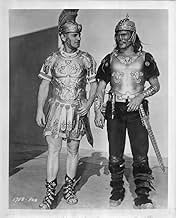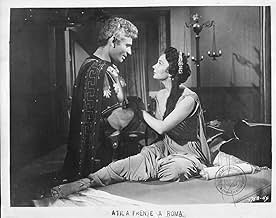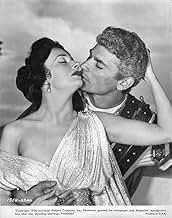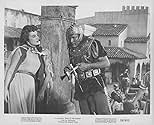Con el Imperio Romano dividido, Atila el Huno espera conquistarlo. En su camino se encuentran un valiente centurión, una bella princesa y el cristianismo.Con el Imperio Romano dividido, Atila el Huno espera conquistarlo. En su camino se encuentran un valiente centurión, una bella princesa y el cristianismo.Con el Imperio Romano dividido, Atila el Huno espera conquistarlo. En su camino se encuentran un valiente centurión, una bella princesa y el cristianismo.
- Dirección
- Guionistas
- Elenco
Ludmilla Tchérina
- Princess Pulcheria
- (as Ludmilla Tcherina)
Robert Bice
- Chilothe
- (as Robo Bechi)
Opiniones destacadas
Very enjoyable Douglas Sirk one and only foray into the sword and sandal genre. Competently made, it has a lush look though obviously made on a small budget. With the stilted dialogue one might expect of such a saga, it somehow remains credible though at times teeters precariously on the borders of camp.
Jeff Chandler turns in a solid performance delivering his lines with diction suited to Shakespeare. Panther like Jack Palance sporting a Fu Manchu moustache is perfectly suited to playing Atilla the Hun which he does with much relish. Despite the numerous forgettable roles in equally numerous trivial movies, one senses that there was something there that never quite came to fruition. The closest he came to really great acting was "The Big Knife" made the following year.
Although Sirk wasn't originally allotted to this movie, it would seem he was willing to try his hand in a genre new to him. As with his only western "Taza Son of Cochise", he proved himself able to work in the genre as well as most, though added little extra of any note.
Expertly filmed by the great Russell Metty who Sirk wisely used on most of his movies.
Jeff Chandler turns in a solid performance delivering his lines with diction suited to Shakespeare. Panther like Jack Palance sporting a Fu Manchu moustache is perfectly suited to playing Atilla the Hun which he does with much relish. Despite the numerous forgettable roles in equally numerous trivial movies, one senses that there was something there that never quite came to fruition. The closest he came to really great acting was "The Big Knife" made the following year.
Although Sirk wasn't originally allotted to this movie, it would seem he was willing to try his hand in a genre new to him. As with his only western "Taza Son of Cochise", he proved himself able to work in the genre as well as most, though added little extra of any note.
Expertly filmed by the great Russell Metty who Sirk wisely used on most of his movies.
This is a 1954 Universal International film titled Sign of the Pagan , full of historic inaccuracy and being well starred Jack Palance as Attila . It results to be an epic adventure yarn set in 5th-Century about the chieftain Attila the Hun who was a leader of the Hunnic Empire , a tribal confederation consisting of Huns , Ostrogoths , and Alans among others, on the territory of Central and Eastern Europe . There a Roman centurion called Marcian (Jeff Chandler) is captured by en route to Constantinople , but he flees . On arrival, he meets the eastern Roman emperor Theodosius (George Dolenz) scheming with Attila to look the other way while the latter marches against Rome . But Marcian (who really was emperor and succeeded Teodosio) gains the favor of Pulcheria (Ludmilla Tchérina of Red slippers) , lovely sister of Theodosius , who favors a united Empire and plotting against Attila . As Attila marches across Empire to Rome and things look bleak for the weakened imperial forces . Emperor Valentinian III sent three envoys, the high civilian officers Gennadius Avienus and Trigetius , as well as the Bishop of Rome Leo I (Moroni Olsen) , who met Attila at Mincio in the vicinity of Mantua and as the conqueror had an awe of the power of the Christians' God , he obtained from him the promise that he would withdraw from Italy and negotiate peace with the Emperor . Against the ravaging hordes of Attila stood a warrior's might and a people's faith! . Against his ruthless pagan lusts , the power of a woman's love!
This spectacular movie contains action , breathtaking battles , thrills , romance , hokey historical events and the crowed scenes of the Huns are impressively made . Big production design , lavishly produced , brilliant photography and rousing soundtrack as you'd expect from Universal International at the time . There takes place a fictitious battle of wits and wills between Attila/Jack Palance and Marcian/Jeff Chandler . Jack Palance dominates with his overacting this historical adventure , while Marciano being grumpily performed by Jeff Chandler . Marcian's character bears remarkable resemblance to General Aecio who vanquished Attile in Chalons . And Pulcheria , who really married emperor Marciano , being decently played by Ludmilla Tchérina . Great support cast provide some solid secondary interpretations such as Allison Hayes as Ildico who was actually wife wife to Attila , Rita Gam , Alexander Scourby , Michael Ansara , Leo Gordon , Eduard Franz as Astrologer , Jeff Morrow and final film of Moroni Olsen . Colorful cinematography in Cinemascope by Russell Metty . Evocative as well as thrilling musical score by two Hollywood classic composers , Hans J. Salter and Frank Skinner . The motion picture was professionally directed by melodramas expert , Douglas Sirk , though it has several flaws , gaps and historical mistakes .
The picture is partially based on historical events about Attila , Marciano , Valentiniano , Pulcheria and emperor Teodosio . During his reign , Attila was one of the most feared enemies of the Western and Eastern Roman Empires . He crossed the Danube twice and plundered the Balkans, but was unable to take Constantinople . His unsuccessful campaign in Persia was followed in 441 by an invasion of the Eastern Roman (Byzantine) Empire , the success of which emboldened Attila to invade the West. He also attempted to conquer Roman Gaul (modern France) , crossing the Rhine in 451 and marching as far as Orleans before being defeated at the Battle of the Catalaunian Plains . He subsequently invaded Italy , devastating the northern provinces, but was unable to take Rome. He planned for further campaigns against the Romans but died in 453 . After Attila's death his close adviser Ardaric of the Gepids led a Germanic revolt against Hunnic rule, after which the Hunnic Empire quickly collapsed . Other films dealing with this historical character are the followings : ¨Attila¨(1953) Pietro Francisci with Anthony Quinn , Sofia Loren and Henry Vidal as general Aecio . ¨The Nibelungos , vengeance of Siegfried¨ (1967) by Harald Reinl with Herbert Lom as Attila . And "Attila" (2001) miniseries by Dick Lowry with Gerard Butler as Attila the Hun , Powers Boothe as Aetius , Simmone Mackinnon as Ildico and Red Rogers as Valentinian .
This spectacular movie contains action , breathtaking battles , thrills , romance , hokey historical events and the crowed scenes of the Huns are impressively made . Big production design , lavishly produced , brilliant photography and rousing soundtrack as you'd expect from Universal International at the time . There takes place a fictitious battle of wits and wills between Attila/Jack Palance and Marcian/Jeff Chandler . Jack Palance dominates with his overacting this historical adventure , while Marciano being grumpily performed by Jeff Chandler . Marcian's character bears remarkable resemblance to General Aecio who vanquished Attile in Chalons . And Pulcheria , who really married emperor Marciano , being decently played by Ludmilla Tchérina . Great support cast provide some solid secondary interpretations such as Allison Hayes as Ildico who was actually wife wife to Attila , Rita Gam , Alexander Scourby , Michael Ansara , Leo Gordon , Eduard Franz as Astrologer , Jeff Morrow and final film of Moroni Olsen . Colorful cinematography in Cinemascope by Russell Metty . Evocative as well as thrilling musical score by two Hollywood classic composers , Hans J. Salter and Frank Skinner . The motion picture was professionally directed by melodramas expert , Douglas Sirk , though it has several flaws , gaps and historical mistakes .
The picture is partially based on historical events about Attila , Marciano , Valentiniano , Pulcheria and emperor Teodosio . During his reign , Attila was one of the most feared enemies of the Western and Eastern Roman Empires . He crossed the Danube twice and plundered the Balkans, but was unable to take Constantinople . His unsuccessful campaign in Persia was followed in 441 by an invasion of the Eastern Roman (Byzantine) Empire , the success of which emboldened Attila to invade the West. He also attempted to conquer Roman Gaul (modern France) , crossing the Rhine in 451 and marching as far as Orleans before being defeated at the Battle of the Catalaunian Plains . He subsequently invaded Italy , devastating the northern provinces, but was unable to take Rome. He planned for further campaigns against the Romans but died in 453 . After Attila's death his close adviser Ardaric of the Gepids led a Germanic revolt against Hunnic rule, after which the Hunnic Empire quickly collapsed . Other films dealing with this historical character are the followings : ¨Attila¨(1953) Pietro Francisci with Anthony Quinn , Sofia Loren and Henry Vidal as general Aecio . ¨The Nibelungos , vengeance of Siegfried¨ (1967) by Harald Reinl with Herbert Lom as Attila . And "Attila" (2001) miniseries by Dick Lowry with Gerard Butler as Attila the Hun , Powers Boothe as Aetius , Simmone Mackinnon as Ildico and Red Rogers as Valentinian .
At 7:05 pm on Saturday, 1 May 1976, BBC 1 showed the complete and uncut version of Sign of the Pagan. Puzzlingly, this was probably the last time that anyone was allowed to see Ludmilla Tcherina's exotic dance number. For reasons known only to the Universal studios, that whole sequence has been deleted from subsequent television showings, both on American station AMC and Britain's Channel 4. Nor do DVD releases contain the dance, even though the main title still credits Kenny Williams as choreographer, leaving viewers wondering what he could have possibly choreographed. Most surprising of all is the 2011 German DVD "special edition" which presents both the original wide screen and 4 x 3 versions. Even here, Universal have cleanly cut the dance number from both prints and both languages.
For those who have never seen the sequence, Attila has just won the palace show fight with Herculanas. After that, the Emperor commands his sister, the Princess Pulcheria, to dance for the visiting barbarians. For the first 50 seconds she performs a graceful and dignified piece of ballet which the barbarians obviously find boring. Therefore, the Emperor tells a servant, "Advise my sister this is not suited to barbarian taste." So ordered, the Princess switches to a more raunchy routine that the visitors find much more enjoyable. This lasts about two minutes. Few genre fans would argue that, in both the Hollywood and Italian epics, the exotic dance interlude is something of a highlight. We get to see beautiful girls in eye-catching costumes, always accompanied by some classy music. Indeed, the ballet score we hear (or used to hear) from Salter and Skinner in Sign of the Pagan is arguably the best music they ever composed.
Universal obviously hope no-one's going to notice what they've done, but why did they do it in the first place? One can only theorize. Perhaps the film was cut at some stage to fit into a fixed television slot. Or maybe the dance was excluded to make the film more suitable for children's matinees. Then nobody remembered to put the scene back? A somewhat wilder theory is that it's a rights issue. Remembering how the Gershwin estate, not liking the Porgy and Bess movie, have tried for years to prevent anyone seeing it, could Ludmilla Tcherina and her estate have somehow bought out this dance scene and are now withholding it because it does not enhance her memory as a classical ballerina? But surely Universal, with all their wealth, would hardly spoil one of their classics just to grab a few dollars?
Whatever the reason, most fans will agree that missing scenes in movies are a continuing source of irritation. Come on, Universal, put it back!
For those who have never seen the sequence, Attila has just won the palace show fight with Herculanas. After that, the Emperor commands his sister, the Princess Pulcheria, to dance for the visiting barbarians. For the first 50 seconds she performs a graceful and dignified piece of ballet which the barbarians obviously find boring. Therefore, the Emperor tells a servant, "Advise my sister this is not suited to barbarian taste." So ordered, the Princess switches to a more raunchy routine that the visitors find much more enjoyable. This lasts about two minutes. Few genre fans would argue that, in both the Hollywood and Italian epics, the exotic dance interlude is something of a highlight. We get to see beautiful girls in eye-catching costumes, always accompanied by some classy music. Indeed, the ballet score we hear (or used to hear) from Salter and Skinner in Sign of the Pagan is arguably the best music they ever composed.
Universal obviously hope no-one's going to notice what they've done, but why did they do it in the first place? One can only theorize. Perhaps the film was cut at some stage to fit into a fixed television slot. Or maybe the dance was excluded to make the film more suitable for children's matinees. Then nobody remembered to put the scene back? A somewhat wilder theory is that it's a rights issue. Remembering how the Gershwin estate, not liking the Porgy and Bess movie, have tried for years to prevent anyone seeing it, could Ludmilla Tcherina and her estate have somehow bought out this dance scene and are now withholding it because it does not enhance her memory as a classical ballerina? But surely Universal, with all their wealth, would hardly spoil one of their classics just to grab a few dollars?
Whatever the reason, most fans will agree that missing scenes in movies are a continuing source of irritation. Come on, Universal, put it back!
Even for an epic, at 92 minutes this movie is quite short, but hey it is a very enjoyable movie regardless. Yes even with the occasionally muddled plot and dull performance of Jeff Chandler.
Sign of the Pagan is an example of a movie that is strikingly photographed in early CinemaScope, lustily staged by the director Douglas Sirk and terrifically scored. And there is some nice dialogue as well, not Oscar-worthy material perhaps but nice enough and the pacing wasn't too bad either. It is the performance of Jack Palance though that takes centre stage, he portrays Atila the King of the Huns as a ruthless and ferocious barbarian, and Palance seems to be having a whale of a time, it was quite simply a hugely enjoyable performance.
Overall, not absolutely brilliant but very enjoyable even with its faults. 7/10 Bethany Cox
Sign of the Pagan is an example of a movie that is strikingly photographed in early CinemaScope, lustily staged by the director Douglas Sirk and terrifically scored. And there is some nice dialogue as well, not Oscar-worthy material perhaps but nice enough and the pacing wasn't too bad either. It is the performance of Jack Palance though that takes centre stage, he portrays Atila the King of the Huns as a ruthless and ferocious barbarian, and Palance seems to be having a whale of a time, it was quite simply a hugely enjoyable performance.
Overall, not absolutely brilliant but very enjoyable even with its faults. 7/10 Bethany Cox
Made the same year as another sword and sandal movie dealing with the same subject ,"Attila Flagello Di Dio" (starring Anthony Quinn and Sophia Loren),it is an icily impersonal movie from Douglas Sirk.It's watchable ,but it could have been done by anyone at all.Sirk's métier was melodrama (he was the master of the genre in the fifties) and western ("Taza,son of Cochise" ) and epics are not obviously his forte.
Although Jack Palance was potentially as ideal as Anthony Quinn to portray the king of the Huns,the screenwriters made him a too polite ,too sentimental ,not bestial enough character (just compare with Anthony Quinn's performance,in a movie which was not better though).
Sirk did not seem to put of lot of effort into his work:"Christian" best describes it:the thunderbolt,the Roman talking about the Virgin and her son to the pagan daughter ,the pope 's intervention (there's a similar scene in the Italian movie),the final victory which was given by "their" God...
Although Jack Palance was potentially as ideal as Anthony Quinn to portray the king of the Huns,the screenwriters made him a too polite ,too sentimental ,not bestial enough character (just compare with Anthony Quinn's performance,in a movie which was not better though).
Sirk did not seem to put of lot of effort into his work:"Christian" best describes it:the thunderbolt,the Roman talking about the Virgin and her son to the pagan daughter ,the pope 's intervention (there's a similar scene in the Italian movie),the final victory which was given by "their" God...
¿Sabías que…?
- TriviaUniversal International's first film in CinemaScope.
- ErroresAll of the mounted troops have stirrups, which would not come into use in Europe for at least another four hundred years.
- Citas
Pope Leo I: Rome is a Christian city, and the Temple of God!
- Créditos curiososAfter the list of actors at the start of the film it says: "AND Statesmen, Citizens, Soldiers of the Armies of the Roman Empire and the Hordes of Attila"
- ConexionesReferenced in Pardon My Genie: Sister, Dear Sister (1972)
Selecciones populares
Inicia sesión para calificar y agrega a la lista de videos para obtener recomendaciones personalizadas
- How long is Sign of the Pagan?Con tecnología de Alexa
Detalles
- Fecha de lanzamiento
- País de origen
- Idioma
- También se conoce como
- Attila, der Hunnenkönig
- Locaciones de filmación
- Productora
- Ver más créditos de la compañía en IMDbPro
Taquilla
- Presupuesto
- USD 1,300,000 (estimado)
- Tiempo de ejecución
- 1h 32min(92 min)
Contribuir a esta página
Sugiere una edición o agrega el contenido que falta

